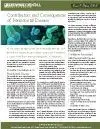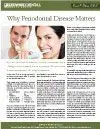 Gum disease, or gingivitis, is an early stage of periodontal disease. It develops when the plaque on your teeth, which is a layer of colorless, sticky substance containing harmful bacteria that forms whenever you eat or sleep, is in contact for too long with your gums. Some women are more prone than usual to developing gum disease when pregnant because of hormonal changes. Whatever the cause, your gums respond by becoming irritated, and they begin to separate from the teeth in an attempt to get away from the plaque.
Gum disease, or gingivitis, is an early stage of periodontal disease. It develops when the plaque on your teeth, which is a layer of colorless, sticky substance containing harmful bacteria that forms whenever you eat or sleep, is in contact for too long with your gums. Some women are more prone than usual to developing gum disease when pregnant because of hormonal changes. Whatever the cause, your gums respond by becoming irritated, and they begin to separate from the teeth in an attempt to get away from the plaque.
Although good oral hygiene may help you avoid developing gum disease, you still might have a problem. You may suspect you’ve developed gum disease if someone tells you that you have persistent bad breath, or if you notice that your gums are sensitive, swollen, and easily hurt. In addition, you may find that when you brush or floss, your gums even bleed. In other cases, though, there are no symptoms at all.
Gum diseases is easily cured in the early stages, but has serious consequences when it is ignored or missed and it becomes full-blown periodontal disease. If your gums have receded from your teeth, you are more likely to develop cavities. You are also more likely to lose both teeth and bone. Scaling and root planing may smooth your teeth below the gum line enough that the gums will reattach themselves to your teeth; otherwise, your dentist may recommend other options to you to help you recover your good oral health.
Other info you may find useful.




Age and Periodontal Contributors and Gum Disease Why Periodontal
Disease Consequences and Heart Disease Disease Matters
of Periodontal Disease


